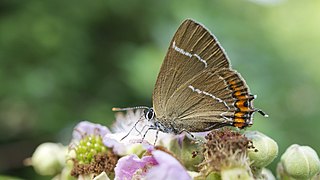
The white-letter hairstreak is a butterfly in the family Lycaenidae.

The Adonis blue is a butterfly in the family Lycaenidae. It inhabits the Palearctic realm.

The purple-shot copper is a butterfly in the family of the Lycaenidae or copper butterflies and in the genus of the Lycaena.

Colias chrysotheme, the lesser clouded yellow, is a small Palearctic butterfly belonging to the family Pieridae.

Parnassius clodius is a white butterfly which is found in the United States and Canada. It is a member of the snow Apollo genus (Parnassius) of the swallowtail family (Papilionidae). Its elevation range is 0–7,000 ft (0–2,134 m).

Parnassius ariadne is a high altitude butterfly which is found in Central Asia. It is a member of the snow Apollo genus (Parnassius) of the swallowtail family (Papilionidae).

Parnassius eversmanni, or Eversmann's parnassian, is a high-altitude butterfly which is found in eastern Russia, Mongolia, Japan, Alaska, and the Yukon. It is a member of the snow Apollo genus (Parnassius) of the swallowtail family, Papilionidae. The species was named to honour Eduard Friedrich Eversmann.

Parnassius nordmanni is a high altitude butterfly which is found the Caucasus. It is a member of the snow Apollo genus (Parnassius) of the swallowtail family, Papilionidae. The larva feeds on Corydalis species including C. alpestris, C. conorhiza and C. emanueli.
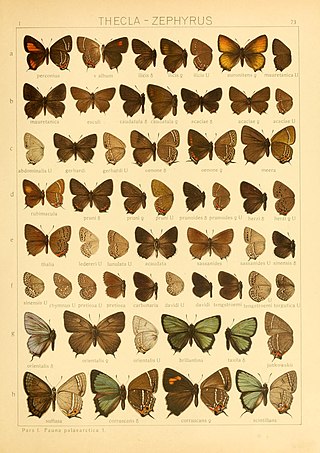
Satyrium ledereri, the orange banded hairstreak, is a butterfly in the family Lycaenidae.

Erebia epistygne, the spring ringlet, is a species of butterfly in the family Nymphalidae. It is found in France and Spain. Its natural habitat is temperate grassland.

Parnassius tenedius, the tenedius Apollo, is an east Palearctic member of the snow Apollo genus (Parnassius) of the swallowtail family (Papilionidae). Populations range from Siberia and the Far East of Russia to the western Chukchi Peninsula, Mongolia and north China. The larva feeds on Corydalis species. In the northern part of its range it is a low altitude butterfly; further south it is montane.

Parnassius phoebus, known as the Phoebus Apollo or small Apollo, is a butterfly species of the swallowtail butterfly family, Papilionidae, found in the Palearctic and North America.

Parnassius orleans is a high altitude butterfly which is found in Mongolia, western China and Tibet. It is a member of the snow Apollo genus (Parnassius) of the swallowtail family, Papilionidae. It was named after Prince Henri of Orléans who discovered it.

Parnassius szechenyii is a high-altitude butterfly which is found in western China. It is a member of the snow Apollo genus (Parnassius) of the swallowtail family, Papilionidae. The species was first described by Imre Frivaldszky in 1886.

The black ringlet is a member of the subfamily Satyrinae of the family Nymphalidae. It is a high-altitude butterfly found in Albania, former Yugoslavia, Bulgaria, Greece, and Romania.

The water ringlet is a member of the subfamily Satyrinae of family Nymphalidae. It is a high altitude butterfly found in the Alps, Bavaria, Styria, Pyrenees, Carpathians and Bulgaria.
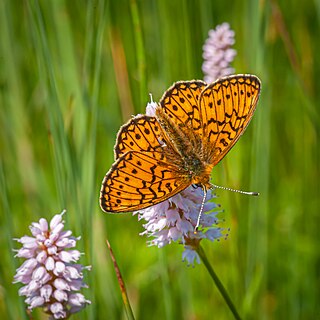
Boloria eunomia, the bog fritillary or ocellate bog fritillary is a butterfly of the family Nymphalidae.
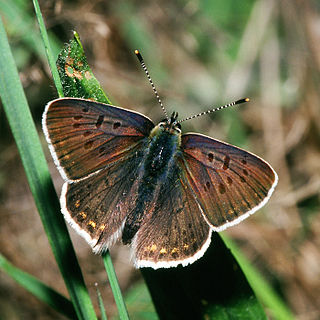
Lycaena tityrus, the sooty copper, is a butterfly of the family Lycaenidae. It is found in Europe.

Polyommatus amandus, the Amanda's blue, is a butterfly of the family Lycaenidae. It is found in the Palearctic realm.
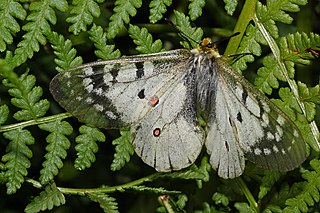
Parnassius smintheus, the Rocky Mountain parnassian or Rocky Mountain apollo, is a high-altitude butterfly found in the Rocky Mountains throughout the United States and Canada. It is a member of the snow Apollo genus (Parnassius) of the swallowtail family (Papilionidae). The butterfly ranges in color from white to pale yellow-brown, with red and black markings that indicate to predators it is unpalatable.




















